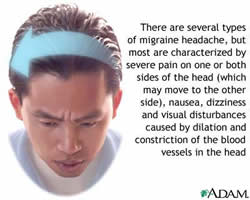Difference between Headache and Migraine
Key difference: A headache usually refers to the appearance of pain anywhere in the region of the head or neck. A headache is a symptom, usually corresponding to a lingering condition of the head and neck. A migraine is classified as a type of headache. A migraine is a chronic neurological disorder that results in reoccurring headaches.
 A headache and migraine are two different conditions that result in pain in the head region. Many people consider a headache and a migraine to be same or similar; however, in reality they are quite different.
A headache and migraine are two different conditions that result in pain in the head region. Many people consider a headache and a migraine to be same or similar; however, in reality they are quite different.
A headache usually refers to the appearance of pain anywhere in the region of the head or neck. A headache is a symptom, usually corresponding to a lingering condition of the head and neck. Medically, a headache is termed as a ‘non-specific symptom,’ which essentially means that it can have various causes. A headache is also known as cephalalgia.
Technically, the brain tissue lacks pain receptors; hence, a brain cannot feel pain. However, the pain associated with a headache actually happens in one or more of the nine areas of the head and neck that do have pain receptors. These nine areas are: the cranium, muscles, nerves, arteries and veins, subcutaneous tissues, eyes, ears, sinuses, and mucous membranes.
There are many different types of headaches; in fact there are more than 200 different types of classified headaches. They can be caused by a variety of reasons, some harmless, others life-threatening. The most common types of headaches include migraine headache, tension-type headache, cluster headaches, drug-induced headache, ice pick headache, medication-overuse headache, etc.
 A migraine is classified as a type of headache. A migraine is a chronic neurological disorder that results in reoccurring headaches. These headaches may be moderate to quite severe in nature. The pain may even be disabling at times. The pain often occurs on one side of the head, and is usually pulsating in nature. The pain may spread to both sides of the head. Other common symptoms include nausea, vomiting, and increased sensitivity to light and/or sound. The pain may also be aggravated by physical activity. Migraines may last anywhere between 2 hours and 3 days.
A migraine is classified as a type of headache. A migraine is a chronic neurological disorder that results in reoccurring headaches. These headaches may be moderate to quite severe in nature. The pain may even be disabling at times. The pain often occurs on one side of the head, and is usually pulsating in nature. The pain may spread to both sides of the head. Other common symptoms include nausea, vomiting, and increased sensitivity to light and/or sound. The pain may also be aggravated by physical activity. Migraines may last anywhere between 2 hours and 3 days.
The actual cause of a migraine is not actually known, however many doctors consider that migraines are a neurovascular disorder and may actually be genetic. Other factors that may result in migraines are environmental reasons and hormonal imbalances. Before puberty, boys are more likely to experience migraines; while as adults, women are two to three times more likely to experience migraines. Approximately, 15% of the global population is affected by migraines at some point in life.
A comparison between a headache and a migraine:
|
|
Headache |
Migraine |
|
Description |
A headache is a pain anywhere in the region of the head or neck. It may be a symptom of an underlying issue or condition. There are over 200 types of headaches. |
Migraine headaches are severe headaches that usually occur with other symptoms. A migraine is a chronic neurological disorder that results in reoccurring headaches. |
|
Causes |
A primary headache is caused due to over activity of pain-sensitive structures in the head. A headache may also be a symptom, usually corresponding to a lingering condition. Most common headaches are tension headaches, caused by tight muscles in your shoulders, neck, scalp, and jaw. |
The exact cause of migraines is unknown. Genetics and environmental factors are considered to play a role. Migraines may be caused by changes in the brainstem and its interactions with the trigeminal nerve, a major pain pathway. Hormonal imbalances, especially in brain chemicals, such as serotonin may also cause migraines. Migraines may be brought on be certain triggers, such as certain foods, conditions, etc. These triggers may differ for everyone. |
|
Risk |
Anybody can get a headache, and for a variety of reasons ranging from harmless to a lingering condition. |
Family history, genetics, age (more commonly adolescence), sex (women rather than men), and hormonal changes are likely to make people more prone to migraines. |
|
Symptoms |
|
|
|
Treatment |
Normal headaches can be treated with over-the-counter drugs, such as aspirin, ibuprofen and paracetamol. However, if it is a symptom of an underlying condition, it may require medical consultation. |
There is no cure for migraines, however, symptoms and conditions can be managed. The headaches can be treated with over-the-counter drugs, such as aspirin, ibuprofen and paracetamol. Avoiding triggers may also help avoid migraines. Lying down in a dark, quiet place with a cold compress may also help. |
|
When to see a doctor |
|
Usually migraines can be avoided by avoiding the triggers. However, if the migraines get worse, occur more frequently than usual, last longer than normal, or migraines last more than 3 days. For people with frequent migraines, doctors can help manage conditions and prescribe preventive medications which will delay and reduce the onset of migraines. |
Image Courtesy: health.com, askdrmakkar.com









Add new comment